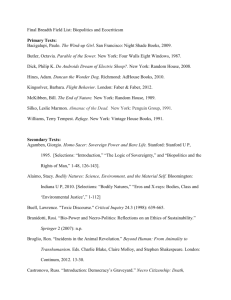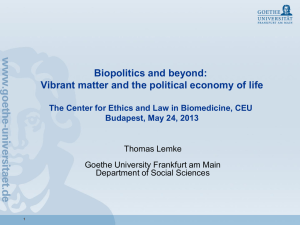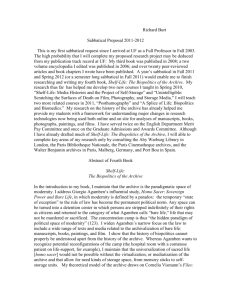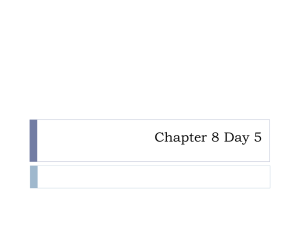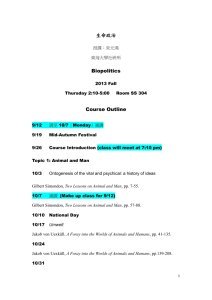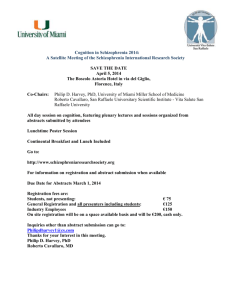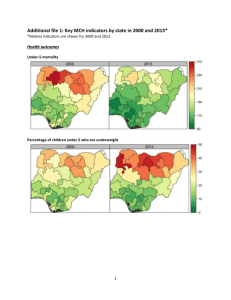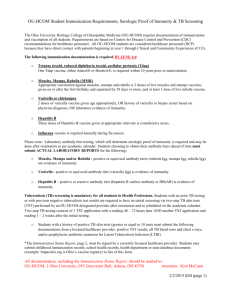immense catastrophe
advertisement
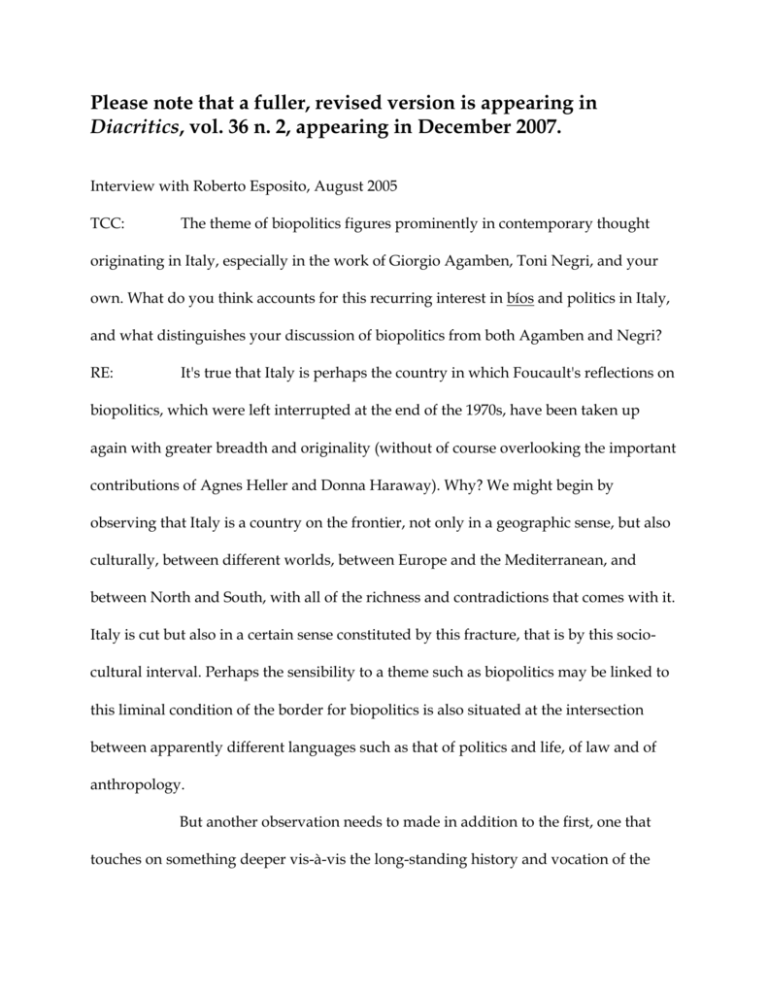
Please note that a fuller, revised version is appearing in Diacritics, vol. 36 n. 2, appearing in December 2007. Interview with Roberto Esposito, August 2005 TCC: The theme of biopolitics figures prominently in contemporary thought originating in Italy, especially in the work of Giorgio Agamben, Toni Negri, and your own. What do you think accounts for this recurring interest in bíos and politics in Italy, and what distinguishes your discussion of biopolitics from both Agamben and Negri? RE: It's true that Italy is perhaps the country in which Foucault's reflections on biopolitics, which were left interrupted at the end of the 1970s, have been taken up again with greater breadth and originality (without of course overlooking the important contributions of Agnes Heller and Donna Haraway). Why? We might begin by observing that Italy is a country on the frontier, not only in a geographic sense, but also culturally, between different worlds, between Europe and the Mediterranean, and between North and South, with all of the richness and contradictions that comes with it. Italy is cut but also in a certain sense constituted by this fracture, that is by this sociocultural interval. Perhaps the sensibility to a theme such as biopolitics may be linked to this liminal condition of the border for biopolitics is also situated at the intersection between apparently different languages such as that of politics and life, of law and of anthropology. But another observation needs to made in addition to the first, one that touches on something deeper vis-à-vis the long-standing history and vocation of the (Interview with Roberto Esposito, Page 2) Italian philosophical tradition. It has always been eminently concerned with the political. If one considers those Italian authors who are known internationally -- from Machiavelli to Vico, to Croce, and to Gramsci -- we can assert that all of their reflections are placed at the point of encounter and tension between history and politics. Unlike the Anglo-Saxon analytic tradition or for that matter German hermeneutics and French deconstruction, the continual problem for Italian philosophy has been thinking the relationship with the present day [contemporaneità], that which Foucault would have called "the ontology of actuality," which is to say an interrogation of the present interpreted in a substantially political key. Thinking above all of Vico or differently of Gramsci, history and politics have constituted the obligatory point of transition from which and through which the dimension of thought generally has been constituted in Italy. In addition to prevailing interest in Italy for political history -- or better for history insofar as it is constituted politically -- we ought to add another interest in the horizon of life that is just as strong and original. Authors such as Bruno and Campanella, for example, worked within such a problematic, in a form that often appears to anticipate Spinoza and his diverging position towards the mechanistic and artificial (anti-naturalist) direction that modern philosophy follows beginning with Descartes and Hobbes. It is against the latter (or at least differently from them) that the philosophical reflection developed in the second Italian Renaissance is to be understood. Such a reflection moves in the direction of a co-mingling between history and nature, between the life of a human being and the life of the world. Perhaps this (Interview with Roberto Esposito, Page 3) difference vis-à-vis modern philosophy also plays a role in the current attention Italian philosophy pays to biopolitics. As to the relation between my perspective on biopolitics and that of Negri and Agamben, I would say that it is situated not in a median point between them, but is external or indeed non-concentric to them. Of course a common element is shared by all: for each of us research in biopolitics begins from the point when Foucault's work was interrupted, in the sense that all our investigations attempt to respond to the underlying question with which Foucault stopped; the question relative to the character and meaning of biopolitics. Are we to understand it as a process that is substantially positive, innovative, and productive, or rather as something negative, as a lethal retreat of life? Leaving aside other questions about philosophic language, or the principal assumptions that characterize our different research interests, it seems to me that the difference between Agamben, Negri and myself will be found in the response to this particular question. Where Agamben accentuates the negative even tragic tonality of the biopolitical phenomenon in a strongly dehistoricizing modality, one that pays tribute to Heidegger, Schmitt and Benjamin, Negri, on the contrary, insists on the productive, expansive, or more precisely vital element of the biopolitical dynamic. The reference is explicitly to the line that moves from Spinoza through Marx to Deleuze. Indeed he imagines that biopolitics can contribute to the reconstruction of a revolutionary horizon at the heart of empire, and so doing absolutely accentuates the moment of resistance to power, in opposition to the letter of the Foucauldian text. For my part, I don't radicalize one of the two semantic polarities of biopolitics to the detriment of the other. Instead I (Interview with Roberto Esposito, Page 4) have tried to move the terms of the debate by providing a different interpretive key that is capable of reading them together, while accounting for the antinomical relation between them. All done without renouncing the historical dimension as Agamben does and without immediately collapsing the philosophical prospective into a political one, as Negri does. As you know, this hermeneutic key, this different paradigm, is that of immunity. TCC: Much of your recent work is dedicated to what you call the immunitary paradigm. Indeed in your previous works, Communitas, then Immunitas and now Bíos, you read modern political, juridical and aesthetic categories as essentially marking an attempt to immunize the social body from the dangers of a communal munus. Could you describe in more detail the features of communitas and the kind of relation you’re drawing between it and a new form of bíos thought outside of the immunitary paradigm? RE: As we know, in bio-medical language one understands immunity to be a form of exemption [esenzione] or protection in relation to a disease. In juridical language immunity represents a sort of safeguard that places the one who holds it in a condition of untouchability vis-à-vis common law. In both cases, therefore, immunity or immunization alludes to a particular situation that protects [mette in salvo] someone from a risk, a risk to which an entire community is exposed. Already here in this mode is defined the opposition between community and immunity that is the basis of my most recent work. Without wanting to enter too deeply into the merits of complex (Interview with Roberto Esposito, Page 5) etymological questions, let's say that immunity, or using its Latin formulation, immunitas, emerges as the contrary or the reverse [rovescio] of communitas. Both words originally derive from the term munus, which in Latin signifies "gift," "office," and "obligation." But the one, communitas, has a positive connotation while the other, immunitas, is negative. This is the reason for which if the members of a community are characterized by an obligation of gift-giving thanks to the law of the gift and of the care to be exercised towards the other, immunity implies the exemption or the derogation from such a condition of gift-giving. He is immune who is safe from obligations or dangers that concern everyone else, from the moment that giving something in and of itself implies a diminishment of one's own goods and in the ultimate analysis also of oneself. At this point my underlying theses are essentially two. The first is that this immunitary dispositif, that is this demand for exemption or protection, which originally were only awarded the medical and juridical spheres, was over time extended to all those other sectors and languages of our life, until it becomes the coagulating point, both real and symbolic, of the entire contemporary experience. In my earlier work, Immunitas, I tried to trace the presence of the immunitary paradigm in theology, anthropology and politics, as well as in that of law and medicine. Certainly this preoccupation with self-protection doesn't only belong to our own period. All societies, just as all individuals, have been concerned with assuring their own survival with respect to the risk of environmental or interhuman contamination. But the threshold of knowledge when faced with the risk of contagion (and therefore the kind of response (Interview with Roberto Esposito, Page 6) that is required) was very different over the course of time, until it reaches its apex precisely in our own period. Here, exactly, is grafted the second thesis: the idea that immunity, which is necessary to protect our life, when brought beyond a certainly threshold, winds up negating it. It is for this reason that I subtitled Immunitas "the protection and the negation of life," though clearly one could also say "protection is the negation of life," in the sense that such a protection, when pushed beyond a certain limit, forces life into a sort of cage or armoring in which what we lose is not only liberty, but also the real sense of individual and collective existence. In other words, we lose that social circulation, which is to say that appearing of existence outside of itself that I choose to describe with the word communitas: the constitutively exposed character of existence. Here then is the contradiction that I tried to bring to light: what safeguards the individual and political body is also what impedes its development, and which beyond a certain point risks destroying it. To use Benjamin's language, we could say that immunization at high doses signifies the sacrifice of the living, that is of every qualified form of life, motivated by simple survival; the reduction of life to its nude biological layer. On the other side of this antinomy, which is to say the connection between the protection and the negation of life, is implicit in the medical procedure of immunization itself. As is well-known, when vaccinating a patient against a disease, one introduces into his or her organism a regulated and tolerable portion, which means that in this case the medicine consists of the same poison from which the organism (Interview with Roberto Esposito, Page 7) needs to protect itself. It is as if to preserve someone's life it is necessary to have him or her in some way taste death, injecting the same disease [male] from which one wants to safeguard the patient. In addition the Greek term pharmakon contains within it, as Derrida's classic study shows, the double meaning of "cure" and "poison," poison as cure, the cure that takes place through a poisoning. Today it is as if modern immunitary procedures have led to the maximum intensification of this contradiction. More and more the cure is given in the form of a lethal poison. TCC: I had the sense reading Bíos that your perspective on the immunitary paradigm has changed since Immunitas; less a means for deconstructing the political and juridical categories of modernity and now seen more as an obstacle for sketching an affirmative biopolitics. What accounts for this change in your perspective, if indeed you agree that such a change has occurred? To return to the question above, do recent events decisively signal a different form of life, or better a bíos at the center of the global polis? RE: No, I wouldn't say that my perspective on the categories of immunization has changed over time. What has changed, it seems to me, at least in part, is the theoretical framework on the inside of which immunization is inscribed. We might say, in fact, that up until Communitas, my intention (as well as the general tonality of my discourse) could somehow be assimilated (admitting of course its specific characteristics) to a deconstructionist perspective applied to the political language of modernity. With regard to this first approach, which appears most evidently and (Interview with Roberto Esposito, Page 8) meaningfully in my work on the impolitical [Categorie dell'impolitico, published in 1988 by Il Mulino, has now been translated into French by Seuil -- Trans.), another movement of thought was progressively superimposed, without either excluding or completely substituting the first. This second movement was more affirmative, and moved in the direction of Deleuze's proposition according to which the primary character of philosophy is that of constructing concepts that are adequate to the events that involve and transform us. The other point of reference in the last few years is that line of inquiry that moves from a Nietzschean genealogy to Foucault's ontology of actuality. It's clear that both these authors and above all the concept of ontology, however we may wish to understand us, refer us to Heidegger, but with an underlying difference that I tried to bring to light in Bíos and more so in another text that was just published on the idea of human nature after humanism.i I'm referring to the centrality that the theme of life has taken on in my research, insofar as such a theme is external or at least marginalized in Heidegger's reflection. We recall that after having thematized it in his own way as "factitious life" in his early years at Freiburg, he then substituted it with the notion of "existence," which was then programmatically subtracted from a biological semantics. As is well known, despite the attention paid to the daily character of existence, the theme of the body doesn't return therefore in Heidegger's thought, which is to say that it doesn't re-emerge precisely as a body biologically defined. It is precisely from this perspective on Heidegger that Merleau-Ponty's reflections began to assume greater importance for me, above all when he decisively distances his thought from the classical phenomenology of the Husserlian sort, exactly (Interview with Roberto Esposito, Page 9) through a thematization of the body in its environmental relation with the theme of "flesh." Without delving too much into the question -- which was my approach in Bíos -it seemed to me that the constant refrain, especially in the later works, to the chiasmus between body and flesh could constitute a useful element for thinking a notion of biopolitics that was in some way positive. For that to be possible, which is to say that a politics of life emerges as thinkable, it's necessary to break the modern relation between biopolitics and immunization. As I've tried to demonstrate in Bíos, especially in those sections dedicated to Nazism and its precedents, it was precisely an exasperated immunitary conception of biopolitics that overturned it in a form of paroxsymic thanatopolitics, that is in a politics of death. Now, to return to Merleau-Ponty, this immunitary, indeed autoimmunitary closure of biopolitics found its expression precisely in the idea of a body that is closed on itself; this is how the Nazi biocracy conceived of the German people. And of course the organicistic metaphor of the political body has always had a prevalently conservative meaning, until it assumes, with fascist corporativism, basically a reactionary character. It is just this blocked and compact notion of body that Merleau-Ponty deconstructs and opens to its outside and to its same internal difference. The notion of flesh, first Christian and then phenomenological, when re-read today against the backdrop of a twentieth-century artistic avant-garde (I'm thinking of Bacon and Cronenberg), can have a disruptive force. Flesh is the body that doesn't coincide completely with itself (as Nazism wanted, according as well to Levinas's interpretation), that isn't unified beforehand in an organic form, and that is not led by a head (which is therefore acephalous as Bataille would (Interview with Roberto Esposito, Page 10) say). No. Flesh is constitutively plural, multiple, and deformed. It is also from this point of view that one can begin to imagine an affirmative biopolitics. TCC: In a series of interviews before his death on the "events" of 9/11 as well as in his earlier contribution to Vattimo's On Religion, Jacques Derrida too speaks of immunity, or better of auto-immunity, and associates it with the effects of trauma: it is the correlative of a threat that something terrible with happen. You, on the other hand, employ a different perspective when discussing (auto)immunity, one more indebted to Foucault's appropriation of a biopolitics first set out in Nietzsche. How do you understand "the ordeal of the event" as Derrida describes the events of 9/11 (and now Madrid and London) as marking a global auto-immunity crises? RE: First, let me begin with a general observation. The fact that some of the most important contemporary authors, working independently from one another and following different paths of thought, came to work on the category of immunization, signals just how significant the category is today. From Derrida to Sloterdijk, from Agnes Heller to Donna Haraway, it seems to me that such a conclusion is clear enough. Today a philosophy that is capable of thinking its own moment [tempo] cannot avoid engaging with the question of immunization. Furthermore, the paradigm of immunization began to emerge as absolutely decisive even before, beginning with Nietzsche, continuing up to Plessner and Gehlen's philosophical anthropology, and then to Luhmann, who sees the immunitary system of our society in law, without of course mentioning medicine. Obviously, the problem resides in the mode by which we (Interview with Roberto Esposito, Page 11) conceive and put it forward for examination. For example, both Sloterdijk and Haraway decline it, albeit differently, in an essentially positive manner, as something that is able to enrich and develop our experience at various levels. Derrida, rather, gives it a much less optimistic even tragic characterization. More than immunity or immunization, he always speaks of "auto-immunity," beginning with the essay on religion and then in his more recent interventions beginning after September 11. The explicit reference is to socalled auto-immunitary diseases. The contemporary political situation can indeed be interpreted in the light of a similar destructive and self-destructive process. On this point I am in complete agreement with him. It seems to me as well that the war currently underway is linked doubly with the immunitary paradigm, and that the war constitutes the form of immunity's exasperation, of its being out of control, which results in a sort of "immunitary crises," in the sense that René Girard gives the expression a sense of "sacrificial crises." The current conflict appears in fact to have arisen from the pressure created by two opposing and specular immunitary obsessions. I'm speaking of Islamic fundamentalism, which has decided to protect (even to the death) its religious, ethnic, and cultural purity from contamination by Western secularization; and the other found in certain parts of the West, which is engaged in excluding the rest of the planet from sharing its own surplus of goods, as well as defending itself from the hunger that strikes a large part of the world that is condemned ever more into a state of forced anorexia. This is not to say that that the two sides have the same responsibility or in other words that a homicidal and suicidal terrorism can have any kind of possible justification. However, looking at what is taking place today (Interview with Roberto Esposito, Page 12) from a systemic perspective, it seems clear that when these two opposing stimuli are intertwined, the entire world is shaken by a convulsion that has the characteristics of the most devastating auto-immune disease: the excess of defense and the exclusion of those elements that are alien to the organism, turns against the organism itself with potentially lethal effects. Not only did the Twin Towers explode, but along with it the immunitary system that had until then supported the world. From this point of view, therefore, I agree with Derrida. Nevertheless, certain relevant differences remains vis-à-vis the formation of the category of immunity that in Derrida emerge as somewhat extemporaneous, in the sense that immunity isn't linked either with the theme of community (which Derrida rejects in favor of the weaker concept, from my point of view, of friendship), nor with that of biopolitics, which is utterly extraneous to him. This isolation of the category of immunity, or better of auto-immunity impedes Derrida from fully grasping the dialectic character of immunity, which is to say that life, be it single or common, would die without an immunitary apparatus. In fact Derrida doesn't treat the long-standing modern character of the immunitary paradigm, which emerges as crushed in the contemporary period. On the other side, it is precisely the indissolvable, albeit negative, relation with communitas that opens for me the possibility of a positive, communitarian reconversion of the same immunitary dispositif on which I began working in the final chapter of Immunitas. And that is in the sense indicated by current medical research. Isn't it precisely the immunitary system, what is defined as "immunological tolerance," that brings with it the possibility of organ transplants? Obviously, translating this non- (Interview with Roberto Esposito, Page 13) negative, hospitable notion of a "common immunity" into political or ethical terms isn't at all simple. Yet, it is precisely on such a possibility that we have to gamble, just as it happens for biopolitics. Moreover, Derrida also saw auto-immunity as a vital power that reacts against itself and which therefore tends to cancel itself out. Today we need to recognize not only the self-destructive aspect of this dialectic, but also those aspects which are potentially creative and productive. TCC: To follow up on globalization and the immunitary paradigm, in Bíos you explicitly associate a specific moment of immunization with modernization, when individualistic or private models substitute forms of organization associated with communitas. Is there something radically different today in the autoimmunity crises you describe that marks a break with the standard periodizations of modernity? RE: If we were to fix a symbolic point of departure for the process of modern immunization, it could probably be individuated in Hobbes. It's with the advent of his philosophy that the question of an immunitary self-preservation of life encamps in the center of political theory and praxis. As is typical of the negative dialectic of immunization, subjects [sudditi] exchange the protection of their life from the risk of death that is implicit in the community with the sacrifice of all their natural rights to the sovereign. All the political categories that Hobbes and those who follow employ, that is sovereignty, property, liberty, are nothing other than the linguistic and conceptual modality by which the immunitary question of the negative safeguarding of individual and collective life is translated into philosophical/juridical terms. In this sense we could (Interview with Roberto Esposito, Page 14) conclude that it wasn't modernity that poses the problem of immunization (in relation to the undoing of ancient communitarian practices), but rather that it is immunization that brings it into existence, or differently invents modernity as a complex of categories able to solve that problem. What we call modernity, generally speaking, is nothing other than that language that allowed for more effective responses to be given to a series of requests for self-preservation originating from the depth of life itself. Such a request for salvific accounts -- consider for example that of the social contract -- was born and then would become ever more pressing, when the mechanisms of defense that had up until that moment constituted the shell of symbolic protection began to weaken, beginning with the transcendental perspective linked to a theological matrix. With these natural defenses lacking, one that had been rooted in a common meaning for all, this sort of primitive immunitary shield demanded, in short, a further dispositif, this time one artificial, that was destined to protect human life from risks that were becoming ever more unsustainable, such as those caused by civil wars and foreign invasions. Modern man needs a series of immunitary apparatuses that are intended to protect a life that has been completely given over to itself when the secularization of religious references takes place. This occurs precisely because man is projected towards the exterior in a form that had never been experienced before. Naturally, as is typical of the immunitary dialectic, all of this has a price that one can measure with the reversal of the original meaning that modern political categories put to the test, beginning with that of liberty. (Interview with Roberto Esposito, Page 15) With that said, once this initial moment is established, it's clear that today we are no longer inside the immunitary semantics of the classic modern period. The underlying difference, which is recognizable in biopolitical terms, resides in the fact that in the classic modern age the immunitary relationship between politics and the preservation of life was still mediated or filtered by a paradigm of order that was articulated in the concepts of sovereignty, representation, individual rights. In the second phase (which for various passages brings us to today), however, that mediation progressively grows smaller in favor of a more immediate superimposition between politics and life. It is then that the immunitary mechanism that had until then been in operation (at least in the sense of insuring a possible order) begins to spin on itself with ever more destructive effects given the continual recourse it has to the production of ever more extensive and intensive securing [securitari] dispositifs. All of this occurs thanks to a series of causes related in their final outcome to what one commonly refers to as globalization, in the sense that the more human beings (but also ideas, languages, and technologies [le tecniche]) communicate and intersect among themselves, the more a preventive immunization is generated as a kind of counterweight. As Derrida emphasizes, the new localistic withdrawals, with their ethno-fundamentalist drifts, can be explained as the immunitary rejection of that general contamination that is called globalization. It was precisely the fall of the Berlin Wall that produced as a reaction the raising of many small walls. It is that which is defined as the passage from immunity to auto-immunity, which is to say an immunity that is destined to destroy itself together with the other. The Nazi thanatopolitics as well as more recent phenomena, such as (Interview with Roberto Esposito, Page 16) those resulting from September 11, can be read in this key. Nevertheless, as I said earlier, the most recent and terrible phase of the auto-immunitary process can also open scenarios never before seen whose traces we cannot yet make out yet. TCC: In your chapter on thanatopolitics in Bíos, I was struck by your description of the Nazi extermination of the Jews as having a “homeopathic tonality, ” which emerges in your reading as implicit in “a unique logical and semantic chain that links degeneration, regeneration, and genocide." In particular you locate three immunitarian apparatuses that characterizes the Nazi thanatopolitics: the normativization of life, the double enclosure of the body, and the anticipatory suppression of life. While recognizing the subtlety of your reading, I have some doubts about such an approach that attempts to inscribe them in the horizon of a contemporary biopolitics. And so: Isn't there a real risk in such an approach of removing the historical specificity of the Nazi extermination camps? RE: Yes, such a risk exists. But to a certain degree it's unavoidable in all analyses of Nazism that always come up against the problem of rationally defining something like genocide, that isn't representable with the customary ethical and political categories and that escape as well from the conceptual language itself. Nevertheless one must run the risk, otherwise we would consign ourselves to either silence (and to the still greater risk of a loss of memory) or to more traditional analyses. After the first allusions in Foucault and Levinas's illuminating fragment on Hitlerism, (Interview with Roberto Esposito, Page 17) Agamben's interventions have been very good on this theme. As for me, it seemed useful to think about the entire cycle of ghenos, from birth to death, one in the other. What death meant for Nazism is what I have tried to bring to light beginning with a reversed and perverted concept of biopolitics. Not only did Nazism's entire praxis pivot around biopolitics, the precipice of a logic that could not result in anything other than an immense catastrophe. Death for Nazism was more complicated. It was what they wanted to avoid at all costs in an obsessive and convulsive search for immortality as well as the instrument with which one thought to obtain it. Precisely because they were obsessed by an unbearable fear of death, that is of seeing what they held to be an elect race degenerate into extinction, the Nazis, after attempting to annihilate what seemed to threaten them, brought within the elected race a massive portion of death. This is the deadly figure that Nazism's biopolitical dispositif literally assumed: wanting to save the life of the German people at any cost by protecting it from a contagion produced by the infected part, they came to the point of consigning all of the German people to death, just as a Hitler's last order issued from the barricades makes clear. The Nazis defended themselves from a presumed death, the result of an infection produced by inferior races, through the unlimited activation of a real death. The logical passage that allowed for such a choice to be made was the idea that life that was to destroyed was in reality already destined for death, a life produced by death and inhabited by death. It was for this reason that those who spread death did not consider themselves assassins, but on the contrary, impartial judges because they were charged with restabilizing the natural borders between life and death that the mixing of races (Interview with Roberto Esposito, Page 18) had cancelled. In their homicidal madness, they believed that they weren't doing anything else but giving back to death the life that had always belonged to it; a life born dead or a living death. But if Nazism conceived of death in this fashion, birth too was felt as something ambivalent, both object of fascination and repulsion, something provocative and at the same time, and in ever greater measure, as a something to annihilate. Gisela Bock has already noted an underlying incongruence between the destruction of birth practiced by the Nazis and the natalist ideology that always accompanied its execution.ii In fact the Nazi commitment for augmenting the birth rate of the German population is well-known. Nazism severely prohibited abortion and supported families financially with more than two children. Not only, but Nazism saw in the continuity of birth of those who carried the same blood, the unifying thread that kept the German national body identical to itself across generations. If the State is really the body of its inhabitants, as the Nazis believed, and if they in turn are reunified in the body of the leader, politics is nothing other than the modality through which birth is affirmed as the only live political force of history. However, birth, precisely because it is invested with this immediate political valence, also becomes the ridge along which life separates from itself, breaking itself into two subordinate orders such as those of masters and slaves, human beings [uomini] and animals, and the living and the dead. Birth becomes the object of a sovereign decision that, precisely because it appears to have arisen directly from life itself, proceeds by cutting it beforehand into zones of different values. This is how we ought to interpret the Nazi ambivalence towards birth: on the one hand, as the (Interview with Roberto Esposito, Page 19) anticipatory exaltation of a life that is racially perfect; on the other hand, as the subtraction of the status of the living from those sentenced death. They could and needed to die since they had never been truly born. Once identified with the German nation, birth suffers the same fate as that of life, which is also held in a biopolitical grip, and which can only be released by a collective death. Translated by Anna Paparcone with Timothy Campbell Roberto Esposito, "Il post-umano," in Post-umano. Relazioni tra uomo e tecnologia nella società delle reti, eds. Mario Pireddu and Antonio Tursi (Milano: Guerini, 2006). ii Gisela Bock, Maternity and Gender Policies: Women and the Rise of the European Welfare States, 1880-1950 (London: Routledge, 1991). i
